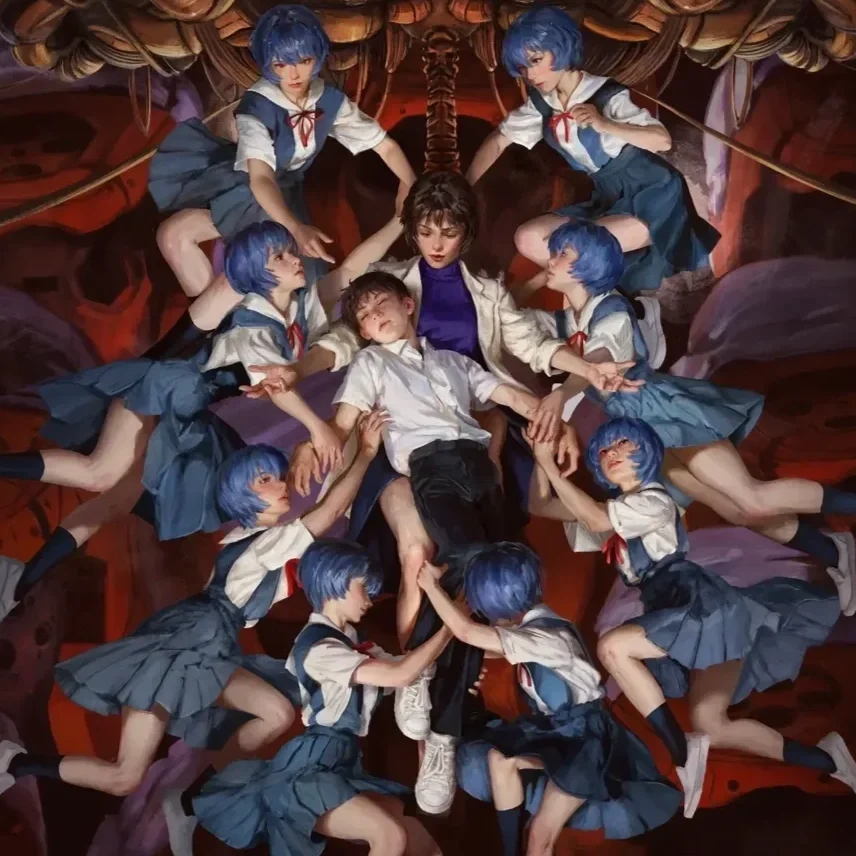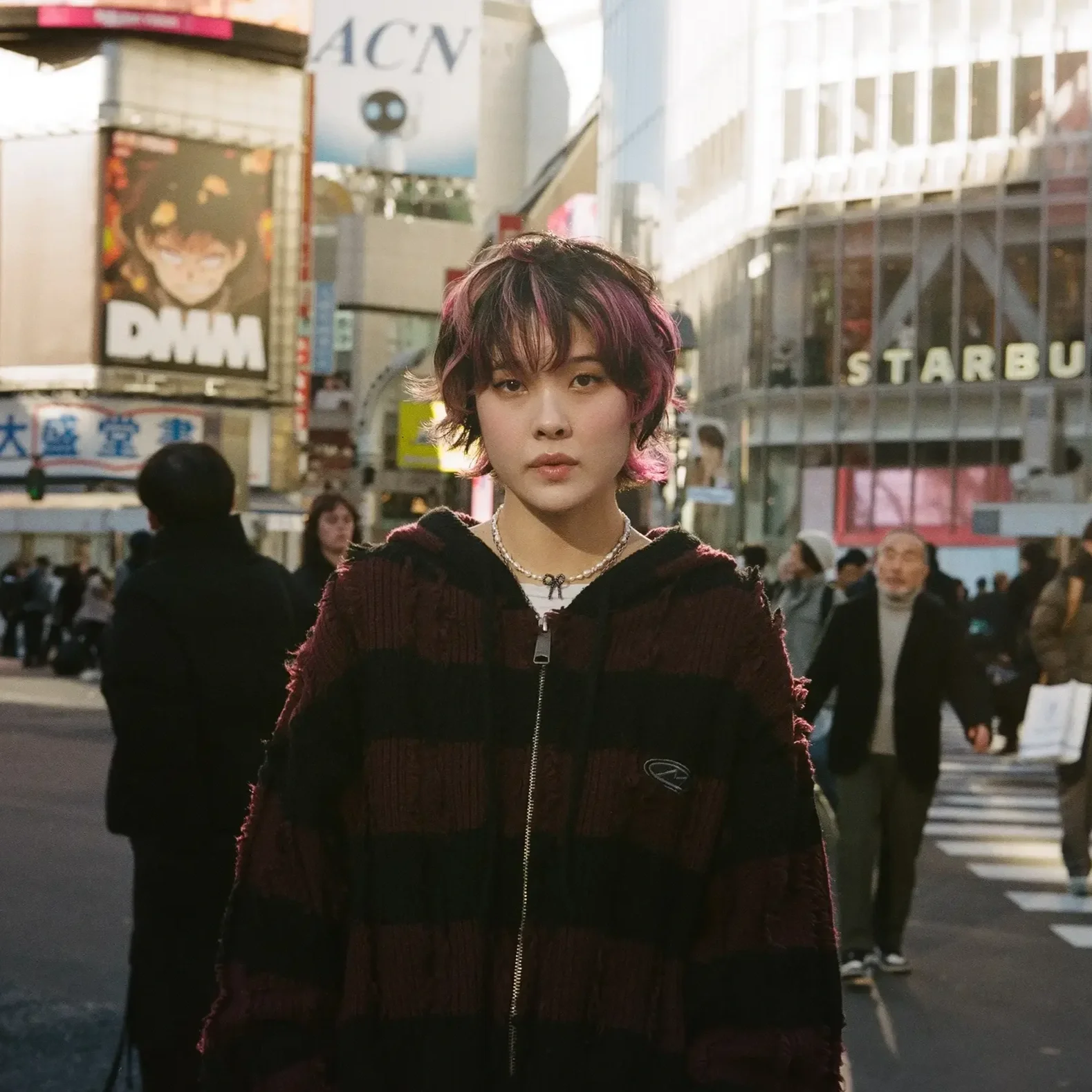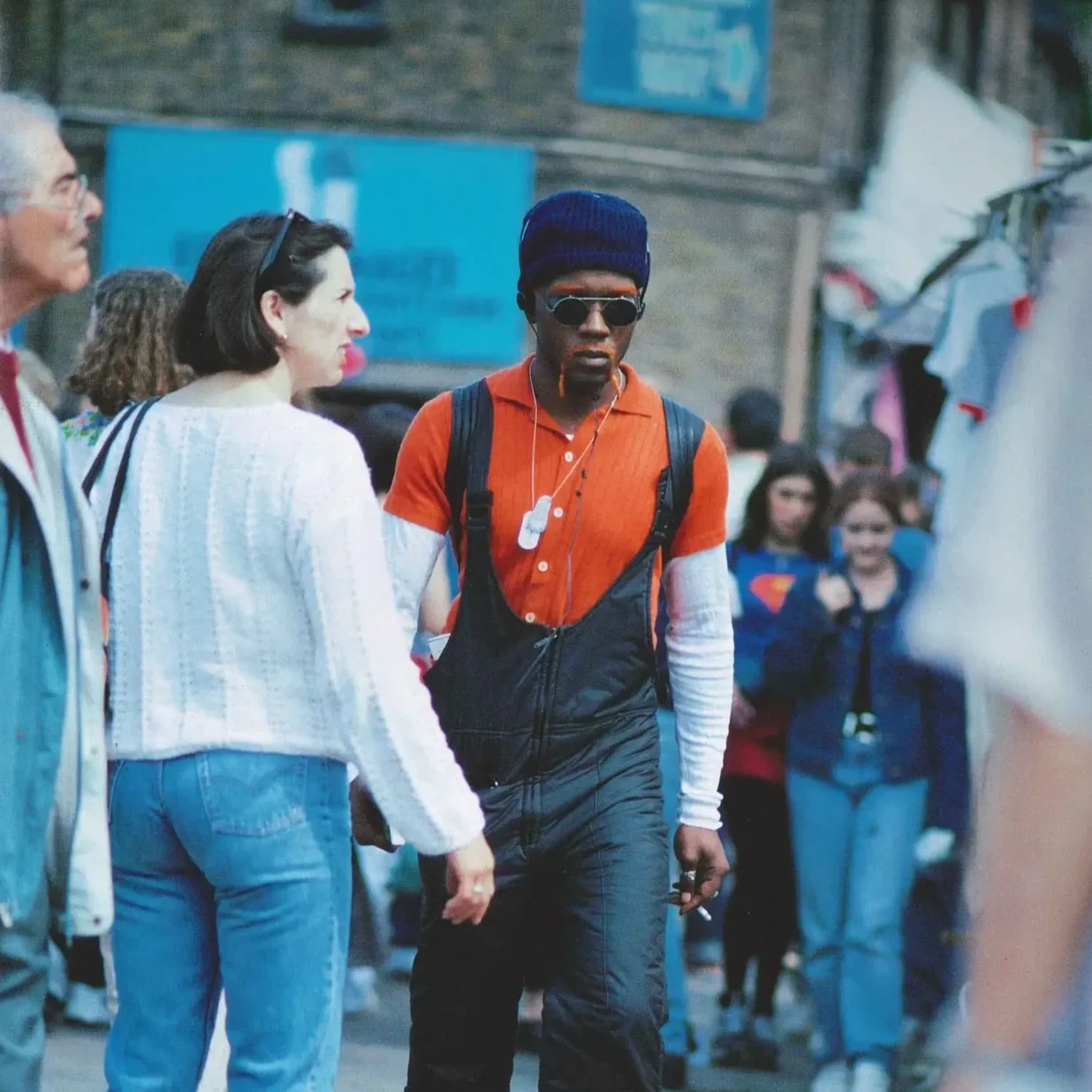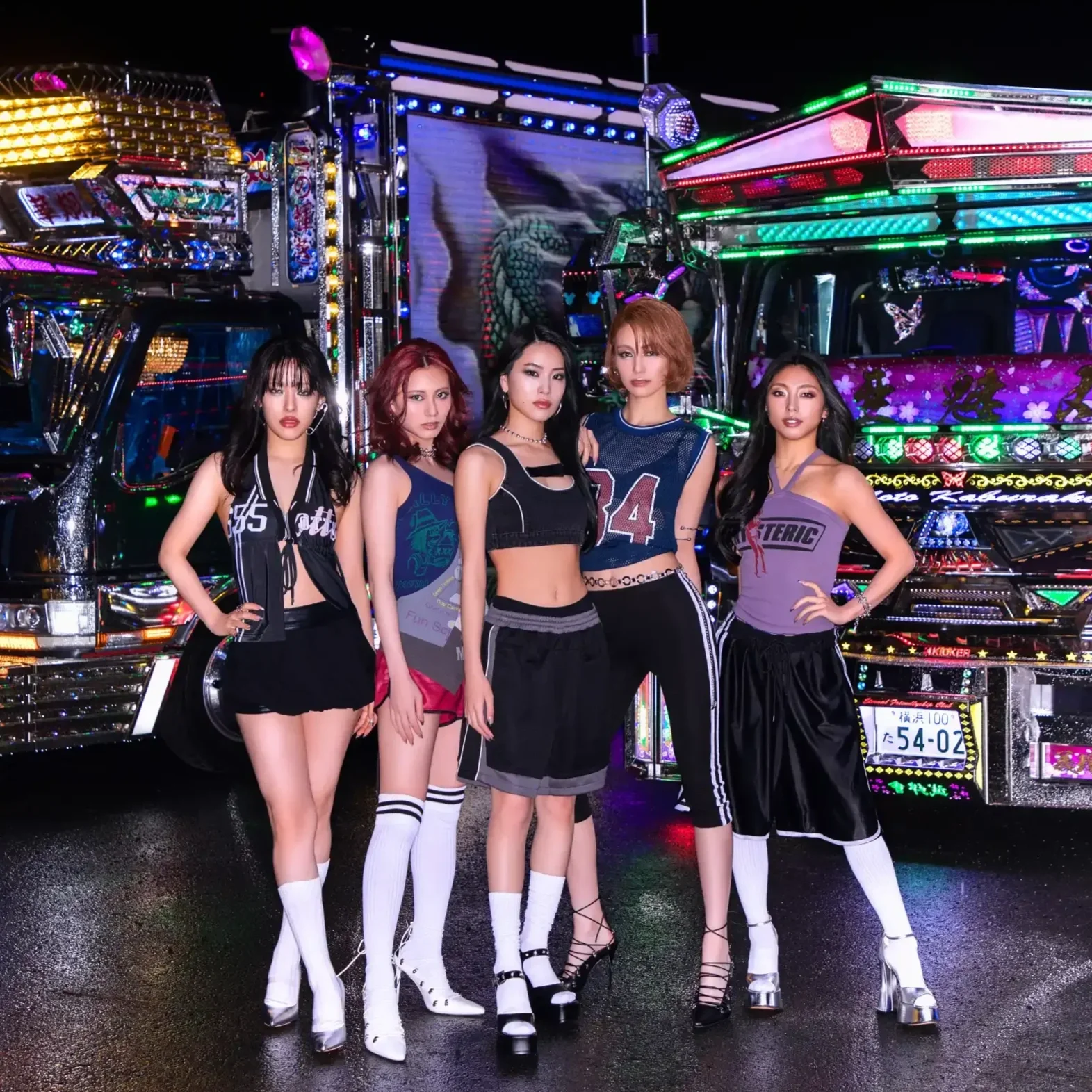Mythic Soundscapes of Japanese Tradition and Sci-Fi - An Interview with Kuunatic
Kuunatic│© Céline Fougerouse
An album can be like a place. In Kuunatic’s recently released second album Wheels of Ömon, the visionary Japanese band sketches out a new world where ancient mythology, shamanic ritual, and utopian science fiction align.
Throughout this 45-minute musical odyssey, the band merges diverse musical influences, traditional Japanese instrumentation, acid-bitten psychedelic rock, and tribal chanting, into a kaleidoscopic soundscape that defies any easy classification.
The name Kuunatic derives from “Kuu,” meaning “moon” in Finnish, and “lunatic”, symbolising both their moon-worshipping spirituality and global reach. Formed in 2016, they started as a challenge to play instruments they’d never played before and to honour local musical traditions from all corners of the world. Kuunatic comprises Fumie Kikuchi on keyboards, Shoko Yoshida on bass, Yuko Araki on drums, and all three on vocals. All distinctive musicians in their own right, with their musical niches ranging from classical Baroque to industrial noise, the trio’s creativity burns brightly altogether.
Spirituality plays a central role in Kuunatic’s creative process. Fumie’s mother, who served as a shamanic medium, reflects a deeper connection to Japan’s often overlooked spiritual undercurrents. Whilst Japan is largely considered atheist, animism and shamanic traditions remain embedded, where natural objects, phenomena and places possess a conscious spirit, and spirit mediums can communicate with the world through ritual, trance, or possession. Likewise, Kuunatic’s latest album moves fluidly between tangible and spiritual, everyday life and religious ritual. Kuunatic’s live performances unfold like ceremonies, imparting the audience a space for reflection and reconciliation across worlds.
Wheels of Ömon extends the mythic world-building from their first album, Gate of Klüna, which told of a battle between goddesses that ends in apocalypse. This time, the band weaves together ancient mythology, invented folklore, and science fiction to explore the genesis of the new world—Kuurandia—emerging from the ashes of the old. Each track traces an orbit around the sun Ömon, guiding listeners through vivid sonic landscapes like healing lakes, transitory seasons, and accompanying rituals.
Endlessly fun to listen to, Wheels of Ömon contains musical references that transcend time and geography, with traditional Japanese instrumentation forming the album’s spiritual and sonic backbone. Kuunatic foregrounds elements from Gagaku (Japanese imperial court and ritual music) and Kabuki (theatrical performance). Instruments like the Shō—a 17-pipe bamboo mouth organ— the Kagurabue—a flute used in shrine music— and Wadaiko —drums used in ancient rituals and festivals— all hark back to archaic ceremonial music, conflating echoes of the past with visions of the future.
In our era so preoccupied with apocalypse, Kuunatic’s vision proposes a new world that looks to the future by going back to zero. Dwarfed by the scale of their musical inspirations, Kuunatic’s prophetic world immerses itself in the specificities of different worlds and folk traditions. More than just music, they ask us what we can recover by contemplating grand histories from several million years and the very roots of human stories. And maybe, we will be able to learn everything all over again.
How are you all finding your UK and Europe tour so far? Is there a song you each like performing the most?
Fumie: It's been great, we always feel it's a long tour at the beginning, but later it feels like it's gone so fast. I enjoy playing “Yew’s Path” the most.
Shoko: “Yellow Serpent” or “Disembodied Ternion.”
Yuko: “Yew’s Path.”
You each have your own solo projects. How do your individual styles influence KUUNATIC, or do you consciously separate your solo and group work?
Fumie: I am a DJ, I listen to many genres but I love 60s / 70s psych and prog rock the most, so it's definitely influencing how I compose Kuunatic’s melodies.
Shoko: Since I often create loop-based songs with vocals when performing my solo project, I incorporate Kuunatic’s harmonies and the vocal techniques I use in my solo work. Additionally, because I personally listen to a lot of jazz, disco, and house music, I often construct the bass melodies inspired by those genres.
Yuko: For me, my solo project - Noise / Electronics and band activities are entirely separated. I relish the teamwork in the band, but something I can't do by myself. I picture it as having distinct musical personas, each catering to my diverse musical appetites.
Kikuchi-san mentioned that her mother is a shaman. Can you share how your connection to shamanic traditions influences your daily life and sound?
Fumie: Yes, my mum was a medium. And I used to participate in a local shrine music and dance group when I was a teenager. So I grew up with a sort of shamanism and Shintoism, and those memories and experiences give me interesting insights or ideas when I create music, especially lyrics and usage of traditional instruments.
Shoko: Personally, I often feel that sound and space possess a soul, so I believe that animism has a very deep connection to making music. Especially when I offer sound to everyone during a performance, I feel a full-body thrill that I don't usually experience in my daily life. I also sometimes feel a tingle deep in my body when I encounter sounds, works of art, or landscapes that I truly love in everyday life. I always think that even if it's a minuscule amount, it's proof that an exchange of energy with the creator or nature is taking place.
Yuko: I have absolutely no spiritual sensitivity and have never had any strange experiences, and I'm quite skeptical of such things. Sometimes on tour, Fumie and Shoko will mention having weird experiences. I don't think they're lying, but I don't fully buy into it either. I'm very interested in shamanism, though, and I'd like to have such experiences, so I'm trying to explore music-accompanied shamanism by collaborating with sensitive members like Fumie and Shoko. When I play the drums, I don't just see myself as 'playing an instrument,' but rather 'leading a ritual.' On the other hand, I believe animism is deeply ingrained in me as someone who grew up in Japan.
Your latest album features several languages — Japanese, Ainu, and what seems to be an invented language. What does it mean for you to sing in these tongues, both real and imagined?
Fumie: Our music concept is always sci-fi and mythology, so it was natural for us to create our own language. Most of our songs we sing in English and in Kuurandian, which is our imaginary planet “Kuurandia”’s language. Kuunatic, 3 of us, are shamans of this planet.
We collaborated with Rekpo (Marewrew / Oki) this time and she sang in Ainu language, which was perfect for our idea because she played a role as a prophet of Klüna.
Your music draws from many global traditions. How do you approach other cultures respectfully, and which non-Japanese traditions shaped the Album?
Fumie: I like to collect local traditional instruments from all over the world, and I like to study their histories and connections to Japanese culture. For example, we used small cymbals called Chappa, their origin is Thailand and Cambodia but they are used in Buddhism rituals, Kabuki, Wadaiko and folklore performances in Japan as well.
Yuko: When incorporating other cultures, it's important for me to understand the roots and origins of their traditions. For example, one of the inspirations for Wheels of Ömon's structure is Indian Raga.
Wheels of Ömon follows a mythic cycle within your invented world of Kuurandia. What’s the mythology behind Kuurandia, and how did figures like Kluna emerge?
Yuko: We started with freely imagining and building a narrative around what would be born and what would happen in Kuurandia. These discussions are always a highlight during our tours. After thoroughly developing that story, we finalized it by drawing inspiration from Earth's and the universe's history, adding scientific backing.
Do tracks like “Yew’s Path” draw from known myths or personal invention, and what emotions do they carry?
Fumie: All our stories are original. “Yew’s Path” is an aftermath of a war (Raven’s War in Gate of Klüna) that happened in Kuurandia. Kuunatic fought against predators, and we won, but were heavily wounded. So our heavy-hearted empress and the people are carrying us wrapped in Yew. Yew has the meaning of rebirth in the western culture, but death at the same time in Japanese culture. The people perform a ritual of resurrection for Kuunatic in “Mavya at Lacus Yom”. “Mavya” comes from the Okinawan chant which means “come back souls”. “Myth of Klüna” is an anthem of a new chapter. Next morning of Kuunatic’s resurrection, people hear the song from the sky so they come outside. Then the moon Klüna becomes two, and crystal stairs appear between the moons. People are invited to Klüna, and two Klüna are described as two “Yellow Serpent”.
Your sound feels ancient despite the tech. What draws you to the distant past, and what can it teach the future?
Yuko: We highly value our primal instincts. Though modern times are full of complexity, we always keep in mind that music and expression were originally very simple.
In a time of dystopian fears, what does utopia mean for you, and what would you bring from Kuurandia into reality?
Fumie: Huge flying yellow serpents, you can ride them and they can take you everywhere.
Shoko:My image of utopia is a place where all life knows its true happiness and exists i n harmony with nature. I often think about how convenient it would be if we had the ability to communicate telepathically, or to give and exchange our own energy.
Yuko: The Utopia for me is maybe a world where everything is independent.
And finally, what is your happiest music-related experience?
Fumie: When I encounter music that makes me cry.
Shoko: It's when I can produce a sound that makes my own cells feel joyful.
Yuko: Performing live shows.







Wenders wanders a city racing forward, searching for Ozu’s stillness.